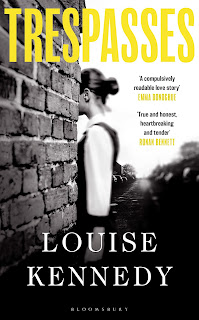Cushla and Michael first meet one evening in her family's pub just outside Belfast. Their attraction is instant and mutual, but what do a young, single, Catholic teacher and an older, married, Protestant barrister have in common, especially when British soldiers stand armed on every street, and sectarian violence is erupting all around them?
Meanwhile through a boy in her class, Cushla becomes involved in the welfare of a mixed Protestant/Catholic family. She starts out with the best of intentions, but it seems like everything she does just makes things worse.
Set in 1970s Belfast, Trespasses is a Romeo and Juliet style tale of two people drawn to each other in defiance of everything that stands in their way.
Beautiful and shocking at the same time, it's told from Cushla's perspective, and the reader can sense the desire sweeping her off her feet, going against everything she considers sensible, and the doubts that plague her about Michael - does he really feel the same, or is she just another extra-marital affair to him?
It's both wonderful and heartbreaking. A feeling of imminent tragedy hangs over it all, but even though you instinctively know this love affair is doomed, when the end does come your breath catches. it's the sort of novel I want to push into everyone's hands and say 'read this!'.
An astounding debut from Louise Kennedy, and I can't wait to see what she follows it with


